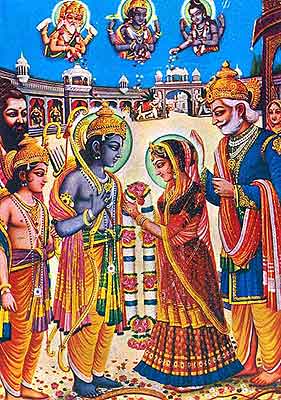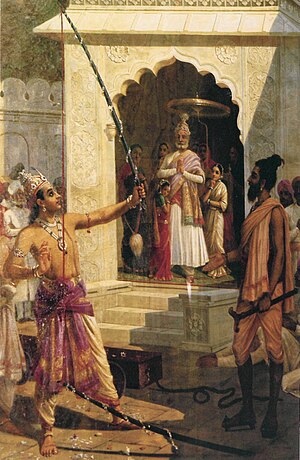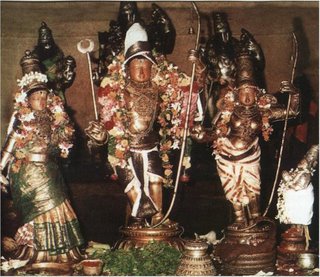ஆலின் இலைப் பாலகனாய் அன்றுலகம் உண்டவனே!
வாலியை கொன்று அரசு இளைய வானரத்துக்கு அளித்தவனே!
காலின் மணி கரையலைக்கும் கணபுரத்தென் கருமணியே!
ஆலிநகர்க்கதிபதியே! அயோத்திமனே! தாலேலோ!
Meaning
The One who ate the world as a boy on the Peepal leaf
The One who killed Vaali and gave the kingdom to the younger monkey
The black gem of Kannapuram, whose feet is touched (washed) by the sea shore
Oh King of Aali (Thiruvaali), the One of Ayodhya, may you sleep
ஆலின் இலைமேல் சிறு பாலகனாய் உருக்கொண்டு பிரளயக் காலத்தில் உலகமெல்லாம் உண்டவனே! வாலியைக் கொன்று கிஷ்கிந்தை அரசை இளைய வானரமாம் சுக்ரீவனுக்குக் கொடுத்தவனே! தென்றல் காற்று (காலின் மணி) நதியின் கரையின் மேல் அலை அடிக்கும் படி செய்யும் திருக்கண்ணபுரத்தில் வாழும் என் கருமாணிக்கமே! ஆலி நகருக்கு அதிபதியே! அயோத்தி மன்னனே! தாலேலோ!
It was a little diffcult to understand the third line 'Kaalin mani, karai alaikkum'. Here, I had to assume that alai means to beat, slap (or touch - more gentle) instead of the normal interpretation as a wave. If people can throw any more light on this, it would be great
Events covered from the Ramayana
Rama killing Vaali and making Sugriva king
After Sita was abducted by Ravana, Rama searches for her and in the process befriends Sugriva. Rama agrees to kill Vaali, after being convinced of his sins. This incident is still considered to be a controversial one where people argue the merits and demerits of the act of Rama killing Vaali unseen by Vaali. But ultimately, Vaali to whom this matters most, sees reason and accepts Rama's action. And he dies peacefully.
A verse from the Kamba Ramayanam is very relevant here. This verse is when Vaali, suprised that he has been struck by an arrow, looks at it:
Mummai saal ulagukku elaam moola manthiraththai murrum
Thammaiye thamarkku nalgum thani perum padaththaith thaane
Immaiye ezhumai noikku marunthinai raama ennum
Semmai ser naamam thannaik kangalil theriyak kandaan.
Meaning: The naamam, which is the manthram forming the basis of all the three worlds. For one who utters, meditates, contemplates on that naamam, that naamam begets the owner (Rama) himself of that naamam to such a devotee. The naamam is so unique. That
naamam can singularly destroy all the sins of the seven births, like the medicine which eradicates the route cause of sickness to this body. Such a special divya [divine] naamam is seen by vaali.
When the arrow bearing such a name hit Vaali, immediately all his sins were destroyed and he was ready to reach the supreme abode of Bhagavan. This is probably Rama's kindest act of mercy, to an erring soul
























